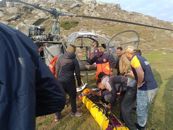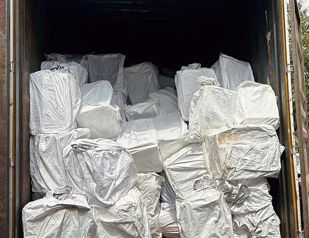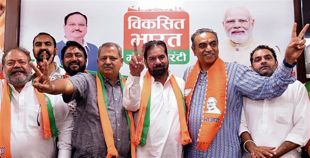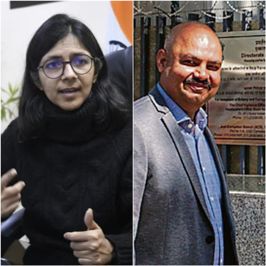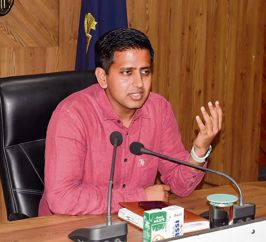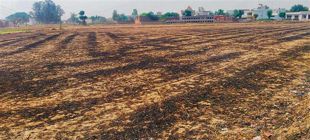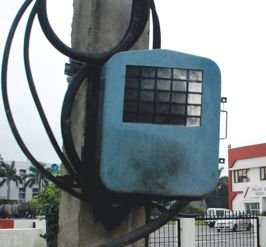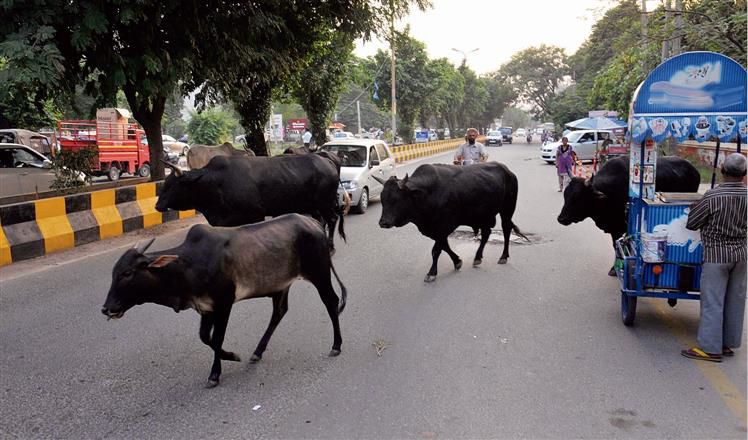
Stray cattle roam on roads, posing a threat to motorists. It often leads to major accidents. - File photo
Come forward to give shelter to stray cattle
Cow cess is being charged by the state government to look after the cattle that have been abandoned or are unclaimed by their owners. The cow cess is to be utilised for the safety of cattle, providing them with feed, construction of proper sheds for the animals and any medical assistance when required. There are a number of gaushalas and the people go there to provide feed for the cows. Gaushalas sell milk of the cows and buffaloes which is also a source of income to maintain salaries of their staff and to procure cattle feed etc. Providing shelter in the winter and summer season to the cattle is the ultimate duty of the administration by providing funds accruing from the cow cess collected. These cattle are also a major cause of road accidents, especially at night. If the government collects cow cess, it is the duty and priority of the administration to provide temporary shelters for the roaming cattle and find out a solution to the problem. How to accommodate these cattle roaming around on roads in various gaushalas is a task that the officials concerned will have to manage. The district administration headed by the Deputy Commissioner and Municipal Commissioner should appoint officers to supervise the work of cattle management and make adequate arrangements. There are a number of social organisations in the city and they should also come forward to provide adequate shelter for the cattle roaming on the roads.
Rajat Kumar Mohindru

Revive defunct Gau Sewa Commission
Protecting and looking after stray cattle, especially in the winter chill, is a complex issue that involves various aspects, including religious beliefs. To tackle it effectively, the Punjab Government established the Punjab Gau Sewa Commission in 2014, a statutory body, responsible for protecting and promoting the welfare of cows and their progeny. The Commission is headed by a chairperson and comprises 11 members from different fields, such as animal husbandry, veterinary science, agriculture, environment, etc. The Commission has several responsibilities, including the establishment, management and functioning of cattle pounds and gaushalas; advising the state government on matters relating to cow protection and development; coordinating with various departments, agencies and organisations working for cow welfare and creating awareness among the public about the benefits of cows and their products in the state. However, this defunct Commission needs to be activated and operationalised genuinely for the purposes aforementioned. Similarly, to generate revenue to provide fodder, shelter and veterinary care for stray cattle through cattle pounds and gaushalas, the Punjab Government levied a cow cess in 2016 on various goods and services in Punjab like vehicle purchase, electricity, liquor, stamp duty etc. However, nothing is available in the public domain about the actual expenditure incurred by the aforesaid Commission or government out of collected cess revenue on cattle welfare. Hence, there is an urgent need to utilise the collected cow cess properly. Moreover, the government should enforce the registration and tagging of cattle with radio frequency identification chips to identify the owners of stray cattle and impose heavy fines and penalties, or both on those who abandon them.
Dr Kulwant Singh Phull
Set up helpline to aid stray cattle
Abandoned cattle heads are spotted everywhere in the city, even on busy roads where traffic is too much. The reason is that their owners abandon these animals because of disease infestation, non-profitability or old age. In all these cases, it is the responsibility of municipal corporations to take care of these animals. Unfortunately, despite sufficient budgetary allocations, the MC always turns a blind eye to its responsibilities, resulting in these stray animals causing a large number of accidents on roads. A large number of gaushalas in the cities too need infrastructural help and trained manpower. Even nowadays when the temperature has plummeted to sub-zero degrees, these animals have to sleep on cold roads. Stray bulls that form a major share of the stray cattle can be seen regularly locking horns with each other in the residential areas and bazaars, creating fear among the residents and commuters. However, MC officials say that they need more space as the number of stray animals is increasing day by day which the ministry concerned must check. Therefore, the need of the hour is for the MC to establish a helpline number so that the moment the residents spot any stray cattle, they can report it to the civic body, which in turn, should pick up stray animals immediately so that chances of accidents due to these animals can be minimised.
Harvinder Singh Chugh
Check on donations to gaushalas required
In Indian mythology, cows hold a sacred status. A creature with such cultural and heritage importance can be spotted lying stray at many dumps and on the roads near Burlton Park and many other places, abandoned and left to starve to death. This is the shameful position of the city. This not only disrespects the belief-value system but also disrupts road traffic and results in numerous accidents. Nearly 900 deaths have occurred due to road accidents caused by stray cattle in Haryana. The reason behind such pathetic conditions is the greediness of many cattle owners and the candidness of the gaushalas. Many dairy farmers first extract the milk from the cows and when it is time to take care of them, they leave the animal on the streets to eat litter and die. Gaushalas are the second partner in crime. They are meant to protect and serve the cows in return for the hefty donations taken by various organisations in the name of the cows, yet approximately 160,000 stray cattle are wandering on the streets of Punjab. This can only mean that the money entrusted by innocent people as a step to protect the cows is not invested in the right place at the right time. The government should keep a check on all the donations made to stop this crime. A yearly balance sheet should be maintained by the gaushalas and provided to the administration which should include all the expenditure and income (donations and money generated from selling dairy products) to prevent the misuse of money. This will instill fear in the organisation and they will work as per the responsibilities they are entrusted with.
Lakshit Jindal
When sacred becomes burden for owners
Stray animals are a big problem in our country. Cows and dogs are often seen roaming on the streets and near the public places. A large number of them eating from garbage bins is also a bad spectacle in almost every city. Against the ludicrous assertiveness of gaushala managements and Animal Husbandry Department taking enough care for protection of the stray cattle, the menace is not reined in. Ironically, the cow is considered a sacred animal, still some are deserted by their owners because they treat it as a financial burden to maintain such cattle upon injury, illness or when they stop lactating. This is a major issue in Punjab and nearby areas, which causes inconvenience to people in many ways. So much so, sometimes it is a prime reason behind fatal accidents. The heads of stray cattle go on increasing on account of the ban on their slaughtering and the trading of cows getting reduced for fear of arrest or lynching by cow vigilantes. In this context, while the gaushalas are to be squarely blamed for failure to take care of the abandoned cattle despite getting hefty donations, the government too cannot escape its responsibility to tackle the grievous problem. It is essential to have adequate shelters for the protection of stray cattle from the winter chill. Simultaneously, the administration should ensure some kind of subvention to the farmers for fending them off in lean periods. Apparently, animals are living beings which deserve due protection in trying circumstances.
Nirmaljit Singh Chatrath
Widen tax net to get more funds for cattle
Winter is in full swing. It has made life miserable both for humans and animals. Humans somehow brave the inhospitable weather. A section of society comes to the rescue of the homeless and the roofless. The government also pitches in. But the cattle suffer a lot in the winter season. There is no system to keep them indoors. Stray cows outnumber cattle shelters. Moreover, injured and sick cows are seldom given shelter by most cow houses. Therefore, cowsheds should be built to protect the cattle from the bone-chilling cold. The authorities need money to build cowsheds. It is not difficult to generate funds for this noble purpose. The government has already levied cow cess on utility bills. It can widen the tax net to fund the construction of cowsheds. The veterinary department may be engaged to count cow/cattle heads. Cows should be tagged with a GPS device. It is both the duty of civil society and the government to protect cattle from the vagaries of nature, especially extreme cold conditions. If cowsheds are constructed, it will serve the dual purpose of protecting cows from inclement weather and humans from fatal road accidents.
Prof Rajan Kapoor
Make arrangements for stray animals
Some major religions of India including Hinduism ordain to protect the cow that is regarded as sacred and revered as ‘Gau Mata’. In every town and city, there is some gaushala or shelter for the cows. People donate liberally to these gaushalas and even state governments give funds to them. There are also veterinary hospitals for the treatment of animals. But in spite of all these arrangements, we find stray cows loitering on the roads and highways. Some of them are sick and wounded and nobody seems to bother about them in this bitter cold. Not only do they suffer a lot, some also become the cause of road accidents which in many cases prove fatal. To save the lives of these stray animals and human beings, it is necessary to keep them at some safe place like a gaushala. The state government, municipalities and corporations should form teams to herd these stray cows and hand them over to the gaushalas. It should be mandatory for the gaushalas to feed and look after them because people donate for their protection. In every city, the government should have some arrangement of its own to provide shelter to stray animals. By providing shelter to these stray animals, one can help in keeping our roads clean to a great extent.
Prem Parkash Punj
Owners often abandon cattle
India is grappling with the stray cattle menace and the problem is increasing with every passing day. India has over 5 million stray cattle, according to livestock census data released in January 2020. Despite providing hefty donations to gaushalas, many heads of cattle are often abandoned by their owners, becoming the cause of fatal accidents on roads and trouble for commuters. The cow is revered as a sacred animal in Hindu religion Still, these are not protected by their respective owners. In case of any injury or illness, these cattle are just abandoned on roads leading to chaos for passers-by. Ironically, people consider it as holy animal as long as it gives milk. The moment the benefit stops, these are abandoned. The government should make stringent rules to control stray cattle menace, and if needed, more gaushalas (cow shelter) should be constructed in districts. Besides, the authorities should also review the status of cow sheds that are already operational, whether they are discharging their duties or not.
Sammy Cheema
Make authorities accountable
First, the authorities concerned of gaushalas should be contacted to look after stray cattle. Secondly, MC authorities should make arrangements to provide shelters to stray cattle and take help of veterinary doctors to cure their injuries and illnesses. Last, but not the least, awareness must be created amongst cattle owners to not abandon them on account of illness or injury as it can be cured by taking the cattle to a veterinary doctor.
Sanjay Chawla
Amend Animal Welfare Act to make changes
An isolated case of a head of cattle that has lost its way to wander aimlessly in city streets was called a stray cow or sometimes a stray dog. Now that the population of such old and ownerless cattle is in thousands, the problem has assumed political dimensions. They are not ‘stray’ cattle. As per Indian traditions, the cow is regarded as a sacred animal and worshipped by the Hindus, but when it gets old and stops producing milk, their owners abandon them to starve and die by inches, besides becoming a road hazard and a nuisance. The problem is compounded by the presence of thousands of dogs on city roads. And this nuisance is not exclusive to Amritsar. It is a national scene, and at root is the Animal Welfare Act, which is long overdue for amendment. It disallows even the use of a stick to drive away a hungry animal. The few cow shelters that the city has, cannot accommodate more than their limited capacity. In fact, there has to be a strict check on dairy owners abandoning their animals and letting them loose on city roads. In some cases, the owners are known, because the cows go back to their homes in the evening. In any case, the roads should be freed of these cows and oxen, which may be shifted to the huge animal care facility at Ropar where they are well looked after in a green environment. Meanwhile, residents and shopkeepers, if they spot one, should inform the animal care authorities who are expected to do the needful. Cow lovers, on the other hand, may gather leafy leftovers from the vegetable market and feed them. By and large, cows respond affectionately to any attempt to feed them. This type of activity has its romance and adventure too. But common citizens should raise their voice for getting the Animal Welfare Act suitably amended. Until that is done, we’ll have to live with the problem, never mind if the city goes to dogs. It is a very sensitive issue with huge political ramifications.
Prof Mohan Singh
QUESTION FOR NEXT WEEK
The alleged involvement of some auto drivers in a number of recent crimes has sparked safety concerns among local residents. Isn’t there a need to ensure adequate scrutiny and stringent monitoring of the background of any person serving in private-public transport?
Suggestions in not more than 200 words can be sent to [email protected] by Thursday (Jan 25)
Join Whatsapp Channel of The Tribune for latest updates.













